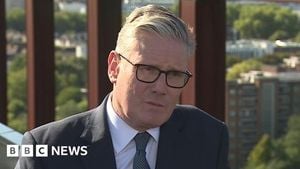Prime Minister Sir Keir Starmer has firmly closed the door on the prospect of a second Scottish independence referendum, declaring that such a vote "won't happen" as long as he is in office, regardless of the outcome of next year's Holyrood elections. In a series of interviews and public statements on September 25, 2025, Starmer characterized the renewed push for independence by the Scottish National Party (SNP) as little more than a "distraction tactic"—a phrase he returned to repeatedly when pressed by reporters from STV News and other outlets.
"We're not having an independence referendum – it won't happen," Starmer told STV News, making his position crystal clear. "It is a distraction tactic which is always deployed by the SNP when they don’t want a discussion about their record." According to STV News, Starmer's comments came in the wake of fresh calls for a new referendum from Scotland's First Minister John Swinney, who has argued that a second vote on the country's place in the United Kingdom is more urgent and necessary than ever.
Swinney, for his part, has staked his party’s strategy on winning a majority of seats at the Holyrood election next May, presenting this as the "only uncontested route" to another independence vote. In a speech earlier in September, Swinney pointed to the precedent set in 2014, when the first independence referendum was held following a majority SNP victory in the 2011 Scottish elections. “That is the precedent – and that is what I am determined to repeat,” Swinney said, as reported by The Scotsman.
But Starmer is not budging. He acknowledged that Swinney has the right to form a Scottish Government if his party wins the most Members of the Scottish Parliament (MSPs) next year, but stressed that the elections are still "a long way out." He also noted that a fresh SNP majority would mean a "third decade in power" for the nationalists—a subtle jab at what he describes as the party’s record in government.
Pressed on whether he would take responsibility if Scottish Labour fails to win at Holyrood next year, Starmer sidestepped the question. However, he was quick to highlight the UK government’s recent financial commitments to Scotland. "At the last Budget, we had a record settlement for Scotland, more money than has ever been given to Scotland under the Budget," he told STV News. The implication was clear: the UK government, under Labour, is delivering for Scotland in tangible ways, and the focus should be on economic growth and public services rather than constitutional wrangling.
The SNP, meanwhile, is doubling down. A resolution set to be debated at the party’s upcoming conference, signed by both Swinney and deputy leader Keith Brown, sets "a clear target...of repeating the 2011 achievement of securing an SNP majority in the election, with at least 65 SNP MSPs, as the only uncontested way to deliver a new vote on Scotland’s future." The SNP points to the fact that pro-independence majorities were returned in both the 2016 and 2021 Scottish elections, yet the UK government has consistently rejected requests for a second referendum.
For many in Scotland, the debate is about more than just constitutional theory. Swinney has argued that the question of Scotland’s future in the UK "has never been more important, more urgent or more necessary." But the UK government’s position remains unchanged. A spokesperson told The Scotsman earlier this month, “This is simply not a priority for Scots. The UK government’s priority is delivering for people in Scotland. The Scottish Government should be focused on working with us on our plan for change: to grow the economy, improve our public services, and put more money in people’s pockets – that is what Scots want to see.”
Starmer’s repeated use of the phrase "distraction tactic" underscores his view that the SNP’s focus on independence is a way to avoid scrutiny of its domestic record. "The point about independence for me is it's a distraction tactic which is always deployed by the SNP when they don't want a discussion about their record," he said, echoing remarks made to STV News and The Scotsman.
While the independence debate continues to dominate headlines, Starmer is also keen to highlight his government’s efforts on other fronts—particularly trade. He revealed that he had personally raised the issue of US whisky tariffs with President Donald Trump during the latter’s recent state visit to the UK, though the trip ended without an agreement. "We’re working very hard on this," Starmer said. "I know just how important whisky is to Scotland and just how important it is that we get the arrangement we need with the US." According to STV News, the UK government remains committed to striking a deal "as soon as possible."
There has been better news on the trade front with India. Earlier in the summer, Starmer’s government struck a deal with Indian Prime Minister Narendra Modi to slash whisky tariffs from a punishing 150% to 75%, with the possibility of dropping further to 40% over the next decade. The deal is expected to bring an extra £190 million into Scotland. "I want to bring forward the India deal so we can implement it as quickly as possible because that will give extra opportunities for whisky," Starmer said, emphasizing the economic benefits for Scotland’s iconic industry.
The stakes are high as the next Holyrood elections approach. The SNP is betting that a renewed majority will strengthen its hand in demanding another referendum, while Labour and the UK government are determined to keep the focus on economic issues and public services. Each side accuses the other of ignoring the real priorities of Scottish voters, and the rhetoric is only likely to intensify as the campaign heats up.
For now, Starmer’s message is unequivocal: no second independence referendum on his watch. Whether that stance will hold in the face of continued pressure from the SNP and shifting public opinion remains to be seen. But with both sides digging in, Scotland’s constitutional future looks set to remain at the center of political debate for the foreseeable future.
As the dust settles on this latest round of political sparring, one thing is certain: the question of Scotland’s place in the UK is far from resolved, and the path forward promises to be anything but straightforward.




